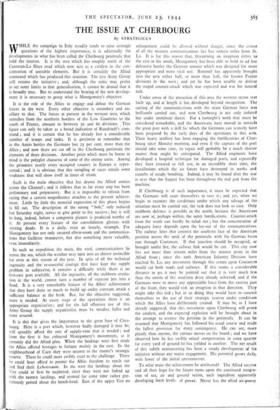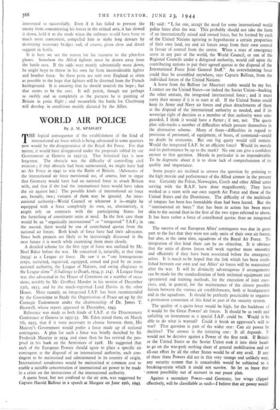THE ISSUE AT CHERBOURG
By STRATEGICUS
WHILE the campaign in Italy steadily tends to raise strategic questions of the highest importance, it is admittedly the developments in what has been called the Cherbourg peninsula that hold the interest. It is the area which lies roughly north of the Carentan-La Haye road which now acts as a catalyst in the con- centration of unstable elements. But it is certainly the Allied command which has produced this situation. The 21St Army Group still retains the initiative ; and, although the critic may prefer to set some limits to that generalisation, it cannot be denied that it is broadly true. But to understand the bearing of the new develop- ment it is necessary to grasp what is Montgomery's objective.
It is the role of the Allies to engage and defeat the German forces in the west. Every other objective is secondary and an- cillary to that. The forces at present in the western area, which stretches from the northern borders of the Low Countries to the south of France, amount to between 50 and 60 divisions. , This figure can only be taken as a broad indication of Rundstedt's com- mand ; and it is certain that he has already lost a considerable number of troops and tanks. It is pertinent to remember that in the Anzio battles the Germans lost 25 per cent. more than the Allies ; and now there are cut off in the Cherbourg peninsula the elements of three divisions. Another point which must be borne in mind is the polyglot character of some of the enemy units. Among the prisoners nearly every occupied country in Europe is repre- sented ; and it is obvious that this mingling of races entails some weakness that will show itself in times of strain.
Such is the main objective that has drawn the Allied armies across the Channel ; and it follows that so far every step has been preliminary and preparatory. But it is impossible to refrain from saying that a certain magnificence attaches to the present achieve- ment. Little by little the material expression of this phase begins to fill out. The description of the strong "bolt," only reduced last Saturday night, serves to give point to the success ; but it will be long, indeed, before a composite picture is produced worthy of it. At present every feature of the consolidation glistens with stirring deeds. It is a daily, even an hourly, triumph. For Montgomery has not only secured elbow-room and the communica- tions that facilitate manceuvre, but also something more valuable, even immediately.
In such an expedition the main, the vital, communications lie across the sea, which the weather may turn into an almost invincible foe even at this season of the year. In spite of all the technical ingenuity and the resourceful courage that have kept the supply problem in subjection, it remains a difficulty while there is no first-rate port available. All the ingenuity, all the stubborn resolu- tion in the world, cannot turn a number of separate jets into a flood. It is a very remarkable feature of the Allies' achievement that they have done so much to build up under constant attack a sufficient balance at the bank. But, for the objective suggested, more is needed. At every stage of the operations there is an appropriate organisation; and for the full offensive use of this Army Group the suppls organisation must be steadier, fuller and more assured.
It is this that gives the importance to the great base of Cher- bourg. Here is a port which, however badly damaged it may be, will speedily afford the sort of supply-vent that is needed ; and from the first it has coloured Montgomery's movements, as it certainly did the Allied plan. When the landings were first made the Allies offered hostages to fortune mainly in the east. In the neighbourhood of Caen they were nearest to the enemy's strategic reserve. There he could most swiftly react to the challenge. There he could least afford to permit the Allies freedom to reach out and find their Lehensraum. In the west the landings about the Vire could at first be neglected, since they were not linked up with the eastern landings, and seemed for some time rather pre- cariously poised about the beach-head. East of the upper Vire no
enlargement could be allowed without danger, since the centre of all the western communications lies but sixteen miles from St. Lo. It is for this reason that, threatening an irruption either to the east or the south, Montgomery has been able to hold to ad hoc defensive battles the German armour which was designed for more appropriate and more vital use. Rommel has apparently brought into the area either half, or more than half,, the known Panzer divisions in the west ; and yet he has been unable to deliver the staged counter-attack which was expected and was his natural task.
Under cover of the attraction of this area the western sector was built up, and at length it has developed beyond recognition. The cutting of the communications with the main German force was brilliantly carried out, and now Cherbourg is not only isolated but under imminent threat. For a fortnight's work that must be considered remarkable, and the Americans have moved in towards the great port with a skill fo; which the Germans can scarcely have been prepared by the early days of the operations in this area. Their heavy artillery has been engaging the fortifications of Cher- bourg since Monday morning, and even if the capture of the port should take some time, its repair will probably be a much shorter matter than might be anticipated. The Allied engineers have developed a hospital technique for damaged ports, and repeatedly they have restored to full use, in an incredibly short time, the installations which the air forces have destroyed in weeks and months of steady bombing. Indeed, it may be found after the war is over that the Sapper has been throughout the real god from the machine.
If Cherbourg is of such importance, it must be expected that the Germans will exert themselves to save it ; and yet, when we begin to examine the conditions under which any salvage of the • situation must be carried out, the task does not look so easy. Only stubborn defence is possible in the north, because the Americans are now at, perhaps within, the outer fortifications. Counter-attack from the south can hardly be ruled out ; but the concentration of adequate force depends upon the lay-out of the communications. The railway lines that connect the southern face of the American position across the neck of the peninsula with the German bases run through Coutances. If that junction should be occupied, or brought under fire, the railway link would be cut. This city now lies not more than sixteen miles from the nearest point in the Allied front ; since the 19th American Infantry Division have reached St. Lo, any movement through this centre upon Coutances would cut both roads and railways. If this seems a considerable distance to go, it may be pointed out that it is very much less than the extent of the southern drive already achieved, and if the Germans were to move any appreciable force from the eastern part of the front, they would risk an irruption in that direction. They might take this risk ; but in so doing they would have to commit themselves to the use of their strategic reserve under conditions which the Allies have deliberately created. It may be, as I have already suggested, that this movement upon Cherbourg will prove the catalyst, and the expectegl explosion will be brought about in the attempt to reverse the position in the peninsula. It can be assumed that Montgomery has followed his usual course and made the fullest provision for every contingency. He can see, more plainly than anyone, the various moves on the board ; and we have observed how he has swiftly seized compensation in some quarter for every yard of ground he has yielded in another. The net result of this subtle manoeuvring has been a steady development of his initiative without any major engagement. His potential grows daily, with fewer of the initial unevennesses.
To what must the achievement be attributed? The Allied success and all their hope for the future turns upon the continued integra- tion of sea, air and ground action, each ingredient apparently .developing fresh levels of power. Never has the allied air-power
intervened so successfully. Even if it has failed to prevent the enemy from concentrating his forces in the critical area, it has slowed it down, held it to the roads when the railways would have been so much more convenient, compelled him to make long detours by destroying necessary br:dges and, of course, given close and direct support in battle.
It is here we sec the reason for his recourse to the pilot-less planes. Somehow the Allied fighters must be drawn away from the battle area. If the odds were merely substantially worn down, he might hope to throw in his own far from inconsiderable fighter and bomber force. So these pests are sent over England as often as possible in the hope that fighters will be diverted from the French battleground. It is amazing that he should nourish the hope ; but that seems to be the case. It will perish, though not perhaps so swiftly and so completely as the pictures he is painting of Britain in panic flight ; and meanwhile the battle for Cherbourg will develop in conditions mainly dictated by the Allies.























 Previous page
Previous page